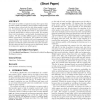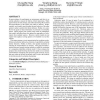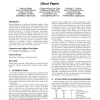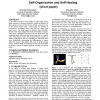ATAL
2008
Springer
13 years 12 months ago
2008
Springer
Life-like agents have the potential to make e-shopping sites on the Web more attractive and persuasive; our interest is to determine how multiple life-like agents should behave as...
ATAL
2008
Springer
13 years 12 months ago
2008
Springer
When autonomous agents decide on their bidding strategies in real world auctions, they have a number of concerns that go beyond the models that are normally analyzed in traditiona...
ATAL
2008
Springer
13 years 12 months ago
2008
Springer
We study the problem of agents locating other agents that are both capable and willing to help complete assigned tasks. An agent incurs a fixed cost for each help request it sends...
ATAL
2008
Springer
13 years 12 months ago
2008
Springer
Distributed Constraint Optimization (DCOP) is a key technique for solving multiagent coordination problems. Unfortunately, finding minimal-cost DCOP solutions is NP-hard. We there...
ATAL
2008
Springer
13 years 12 months ago
2008
Springer
As computers inevitably begin to replace humans as the drivers of automobiles, our current human-centric traffic management mechanisms will give way to hyper-efficient systems and...
ATAL
2008
Springer
13 years 12 months ago
2008
Springer
Mechanism design (MD) has recently become a very popular approach in the design of distributed systems of autonomous agents. A key assumption required for the application of MD is...
ATAL
2008
Springer
13 years 12 months ago
2008
Springer
In open settings, the participants are autonomous and there is no central authority to ensure the felicity of their interactions. When agents interact in such settings, each relie...
ATAL
2008
Springer
13 years 12 months ago
2008
Springer
Reward shaping is a well-known technique applied to help reinforcement-learning agents converge more quickly to nearoptimal behavior. In this paper, we introduce social reward sha...
ATAL
2008
Springer
13 years 12 months ago
2008
Springer
This paper discusses the application of distributed constraint optimization to coordination in disaster management situations under sub-optimal network conditions. It presents an ...
ATAL
2008
Springer
13 years 12 months ago
2008
Springer
As the ability to produce a large number of small, simple robotic agents improves, it becomes essential to control the behavior of these agents in such a way that the sum of their...




